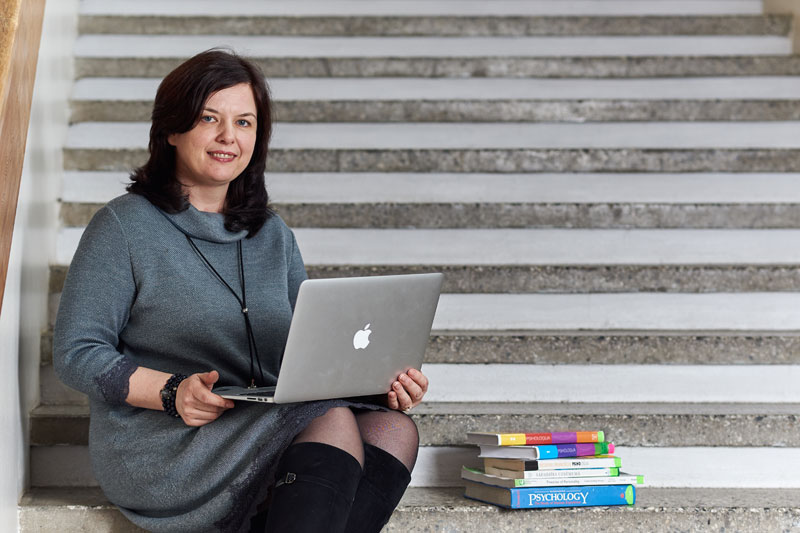Doctoral studies provide an opportunity to advance
RSU doctoral student Ilze Dreifelde
Doctoral study programme: Psychology
Thesis title: The correlation between the behavioural self-regulation skills and personal characteristics of employees of an organisation and self-efficacy
Scientific supervisors: Assoc. Prof. Maija Zakriževska (RISEBA) and Assoc.
Prof. Sandra Mihailova (RSU)

WHO?
"I took up psychology studies in 1996 when I was looking for answers to a variety of psychology-related questions. At that time psychology was a new study area in Latvia and none of us knew much about it.
My psychology studies have been gradual and with pauses in between. I started studying organisational psychology. After completing my Bachelor’s degree, I proceeded to Master's studies at Riga Higher School of Pedagogy and School Management (RPIVA), followed by postgraduate studies at Rīga Stradiņš University (RSU) in the Master’s study programme Occupational Therapy. Along with the occupational therapy studies, I acquired a Supervisors’ speciality at RSU. After that, I took time off from studies and over a year ago I felt a renewed interest and had the feeling that there was space in my life that I could devote to doctoral studies in the RSU doctoral study programme Psychology.
During postgraduate studies, much attention is devoted to research and that is something I want to do. For many years I have been lecturing at RSU Department of Welfare and Social Work, therefore research is nothing new to me as I read, search and analyse a lot when preparing for lectures, nevertheless there are still so many things I do not know.
Doctoral studies are a means for widening my horizons and gives me an opportunity to develop. They really are studies at another level, when the lecturers no longer teach me but share their knowledge and experience.”
WHAT?
"In my doctoral thesis I am exploring the correlation between the behavioural self-regulation skills and personal characteristics of employees of an organisation and self-efficacy.
There is a growing need and understanding of how the development of different cognitive, emotional and behavioural self-regulation skills might contribute to more successful functioning of an individual within society and in the context of an organisation, this issue is more topical than for the community as a whole.
In my thesis, I will place emphasis on behavioural self-regulation skills or in other words on the ability to discipline oneself. Behavioural self-regulation skills include, e.g. the ability to tolerate uncertainty during periods when the organisation is facing changes, the ability to become more active while heading towards a specific, targeted activity, look for opportunities, implement an action plan, not opposing something by being rude, not practicing "eye for an eye" tactics, having the strength to overcome the willingness to postpone a task, hesitate (which is treated as a self-regulation error) etc.
The development of self-regulation skills is determined by inheritance, early childhood experience, personal qualities and the social environment. In the case where self-regulation skills are poorly developed, the individual, when facing hardships or challenges, is taken over by anxiety. It makes us defend ourselves, postpone things, experience various unpleasant feelings. The better the self-regulation skills the lower the level of anxiety, allowing one to more effectively attain various professional, daily and relationship goals which amounts to self-efficacy - an individual’s confidence in their ability to deal with life tasks and face various daily hardships."
WHY?
"During the nine years of maintaining a private practice and providing the consultative support of a supervisor on employment-related matters for individuals as well as groups, I have noticed that alongside salary, work efficiency and other achievement- related issues faced by an organisation, the importance of mutual relationships is gaining in importance. During problem solving or conflict situations, mutual relationship flaws are frequently referred to as “communication errors”, "absence of cooperation skills", lack of unity etc. Nowadays, good inter-employee relations within an organisation, particularly during times of organisational change are becoming equally as important as the organisation’s performance indicators.”
HOW?
"The research will be carried out by reviewing scientific literature and conducting employee surveys in different organisations, followed by a comparison of the results obtained and identification of the study subject – the correlation between behavioural self-regulation skills, personal characteristics and self-efficacy.
Currently one of the primary research tasks is to adapt self-assessment surveys to the Latvian scenario that will contribute to identification of the behavioural self-regulation skills of those surveyed. Adapting of the survey for the Latvian setting includes several tasks: translation of the survey from English into Latvian and questioning of at least 200 individuals working in different organisations.
The survey will help to understand which particular personal qualities determine the development of one or various self-regulation skills and whether and how these affect self-efficacy – a trust in one’s ability, factors fostering the development of these skills, whether the behavioural self-regulation skills are better in men or women and whether better developed self-regulation skills have a connection with a higher quality of life for the employees of Latvia’s organisations etc.”
CONCLUSIONS
"At this point it is too early to predict the outcomes of the thesis but I think that I will succeed in proving my hypothesis that better developed behavioural self-regulation skills determine an individual’s self-efficacy – faith in one’s abilities – and allow one not to avoid or postpone one’s goals and be more successful in taking targeted measures towards attaining them.”
Related news
 Sports psychology study on young athletes: how burnout, anxiety, and wellbeing shape distinct athlete profiles Research, Psychology
Sports psychology study on young athletes: how burnout, anxiety, and wellbeing shape distinct athlete profiles Research, Psychology


